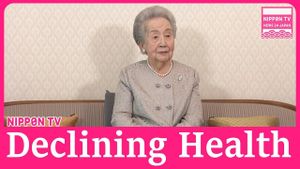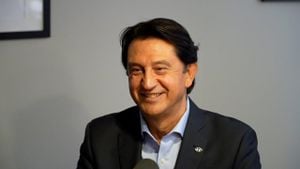Iran is set to launch what has been controversially termed as the "hijab removal treatment clinic" aimed at women who defy the mandatory hijab laws. This initiative, announced by Mehri Talebi Darestani, who heads the Women and Family Department under Tehran’s Headquarters for the Promotion of Virtue and Prevention of Vice, has sparked outrage and backlash from various human rights groups and activists.
The proposed clinic is framed by Iranian authorities as a compassionate space, offering psychological and educational counsel to women struggling with the societal and religious expectations surrounding hijab usage. According to Talebi, the goal is to help women reconnect with their "Islamic identity" and comply with the nation’s dress code. “It’s not just about the hijab; it’s about their social and psychological wellbeing,” Talebi stated, attempting to justify the initiative.
Critics have vehemently opposed this initiative, indicating it may serve as a coercive mechanism rather than the administrative support it purportedly claims to provide. Iranian human rights lawyer Hossein Raeesi emphasized his concerns, arguing the clinic is neither Islamic nor legally grounded within Iranian law. He views it as another attempt to impose forced conformity upon women who choose not to adhere to the hijab mandate.
Western-based Iranian journalist Sima Sabet critiqued the establishment of such clinics as "chilling" and labelled it as illustrative of the state’s excessive control over women's rights. “This isn’t about treatment; it’s about treating women as mentally unstable for rejecting government ideology,” Sabet expressed, highlighting the disturbing underlying implication of these clinics.
The clinic’s announcement coincides with rising tensions across Iran, especially following the tragic death of Mahsa Amini, who died last year after being arrested for allegedly violating hijab laws. Amini's death catalyzed nationwide protests under the banner of the "Woman, Life, Freedom" movement, drawing global attention to the oppressive measures faced by women under the Islamic Republic's stringent policies.
During these protests, many women have publicly removed their hijabs, defying government mandates and risking severe reprisals. Some have gone as far as engaging in acts of civil disobedience, leading to serious consequences. Reports have emerged of women being arrested for their participation and treated harshly upon detention, with some subjected to forced medication and psychiatric evaluations after having dared to challenge the state's rigid dress code.
One particularly alarming incident involved Roshanak Molaei Alishah, a young woman reportedly detained after publicly confronting harassment over her hijab. Human rights organizations are increasingly alarmed at the Iranian government’s use of state institutions to silence dissent and impose punitive measures against those who resist imposed ideological norms.
Critics argue the clinic may be more akin to a punitive institution than the supportive environment it purports to establish. “It won’t be a clinic; it will be like prison,” stated one woman, echoing the fears of many Iranian citizens who feel oppressed by their government’s constant surveillance and punishment of perceived deviations from state-sanctioned behavior. This sentiment resonates deeply as many citizens grapple with economic instability, and they feel their government prioritizes policing their attire over addressing pressing societal issues.
Despite the claims of voluntary participation, many fear the environment created by such clinics could mimic oppressive detention facilities, where women are coerced to conform to state ideologies under the guise of psychological support. Amnesty International and other human rights advocates have voiced strong concern about the potential for these clinics to operate as instruments of state control, contributing to broader narratives about gender-based oppression within Iran.
Just last week, Iranian authorities took decisive actions against prominent actresses who publicly voiced opposition to the hijab laws, effectively banning them from working within the film industry. This escalation of tactics by the government, including the announcement of the hijab removal treatment clinic, suggests a concerted effort to re-establish control over women’s bodies, behaviors, and rights.
This latest governmental initiative has made it abundantly clear how the struggle for women’s rights remains at the forefront of tensions within Iran. Despite state efforts to reinforce obligatory dress codes and societal norms, many Iranian women continue to fight boldly against these restrictions, risking their freedom and safety to assert their right to choose how they present themselves.
The response to the clinic's impending establishment reflects the growing resistance against authoritarian practices and the demand for transformative change, emphasizing the need for dialogue around women's rights and freedoms globally. While officials insist these treatment facilities aim to uphold national values and promote Islamic teachings, citizens assert their resolve to challenge these oppressive laws, advocating for the right to choose corresponding with their individual beliefs.
Nonetheless, the international community watches closely as Iran’s attempts to mediate social compliance through coercive methods intensify. The upcoming clinic highlights the broader narrative of state-sanctioned oppression faced by women globally, stressing the importance of continual activism and support for those who challenge authority.
The launch of the clinic undoubtedly symbolizes another layer within the complex fabric of challenges confronting not only Iranian women but those around the world who strive for personal freedom against oppressive governmental norms. How the clinic will operate remains to be seen, but it stands as yet another pivotal chapter within the growing narrative of resistance against gender-based injustices.



